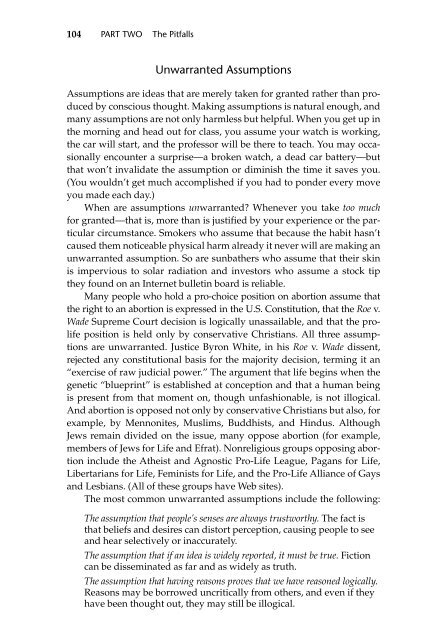Beyond Feelings
Beyond Feelings
Beyond Feelings
You also want an ePaper? Increase the reach of your titles
YUMPU automatically turns print PDFs into web optimized ePapers that Google loves.
104 PART TWO The Pitfalls<br />
Unwarranted Assumptions<br />
Assumptions are ideas that are merely taken for granted rather than produced<br />
by conscious thought. Making assumptions is natural enough, and<br />
many assumptions are not only harmless but helpful. When you get up in<br />
the morning and head out for class, you assume your watch is working,<br />
the car will start, and the professor will be there to teach. You may occasionally<br />
encounter a surprise—a broken watch, a dead car battery—but<br />
that won’t invalidate the assumption or diminish the time it saves you.<br />
(You wouldn’t get much accomplished if you had to ponder every move<br />
you made each day.)<br />
When are assumptions unwarranted? Whenever you take too much<br />
for granted—that is, more than is justified by your experience or the particular<br />
circumstance. Smokers who assume that because the habit hasn’t<br />
caused them noticeable physical harm already it never will are making an<br />
unwarranted assumption. So are sunbathers who assume that their skin<br />
is impervious to solar radiation and investors who assume a stock tip<br />
they found on an Internet bulletin board is reliable.<br />
Many people who hold a pro-choice position on abortion assume that<br />
the right to an abortion is expressed in the U.S. Constitution, that the Roe v.<br />
Wade Supreme Court decision is logically unassailable, and that the prolife<br />
position is held only by conservative Christians. All three assumptions<br />
are unwarranted. Justice Byron White, in his Roe v. Wade dissent,<br />
rejected any constitutional basis for the majority decision, terming it an<br />
“exercise of raw judicial power.” The argument that life begins when the<br />
genetic “blueprint” is established at conception and that a human being<br />
is present from that moment on, though unfashionable, is not illogical.<br />
And abortion is opposed not only by conservative Christians but also, for<br />
example, by Mennonites, Muslims, Buddhists, and Hindus. Although<br />
Jews remain divided on the issue, many oppose abortion (for example,<br />
members of Jews for Life and Efrat). Nonreligious groups opposing abortion<br />
include the Atheist and Agnostic Pro-Life League, Pagans for Life,<br />
Libertarians for Life, Feminists for Life, and the Pro-Life Alliance of Gays<br />
and Lesbians. (All of these groups have Web sites).<br />
The most common unwarranted assumptions include the following:<br />
The assumption that people’s senses are always trustworthy. The fact is<br />
that beliefs and desires can distort perception, causing people to see<br />
and hear selectively or inaccurately.<br />
The assumption that if an idea is widely reported, it must be true. Fiction<br />
can be disseminated as far and as widely as truth.<br />
The assumption that having reasons proves that we have reasoned logically.<br />
Reasons may be borrowed uncritically from others, and even if they<br />
have been thought out, they may still be illogical.


